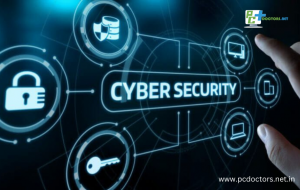Cybersecurity in Healthcare
Cybersecurity in Healthcare: Safeguarding Patient Data in a Digital Era- August 25, 2023
- Cyber Security Services
- Posted by Administrator
- Leave your thoughts
Introduction:
In an increasingly interconnected world, where technology plays a pivotal role in healthcare, the protection of patient data has become a paramount concern. Cybersecurity in healthcare is crucial to safeguarding sensitive information, ensuring the privacy and trust of patients, and maintaining the integrity of healthcare systems. This article explores the significance of cybersecurity in the healthcare sector and highlights the measures taken to protect patient data in the digital era.
- The Growing Importance of Cybersecurity in Healthcare:
In recent years, the healthcare industry has witnessed a rapid digital transformation, with electronic health records (EHRs), telemedicine, and connected medical devices becoming commonplace. While these advancements offer numerous benefits, they also present unprecedented challenges in terms of data security. Cyberattacks targeting healthcare organizations have increased in frequency and sophistication, making robust cybersecurity measures indispensable.
- Risks and Vulnerabilities in the Healthcare Sector:
The healthcare sector is an attractive target for cybercriminals due to the abundance of valuable patient data and the potential disruptions that can be caused by compromising healthcare systems. Factors such as outdated infrastructure, lack of cybersecurity awareness among staff, and the complexity of interconnected networks further amplify the vulnerabilities. From ransomware attacks to data breaches, the consequences of cyber incidents in healthcare can be devastating, compromising patient confidentiality and impacting the quality of care.
3.Strategies for Safeguarding Patient Data:
- Encryption and Access Controls: Implementing strong encryption techniques and access controls is fundamental to protect patient data. Encryption ensures that data is securely stored and transmitted, making it unreadable to unauthorized users. Access controls, such as multi-factor authentication and role-based access, limit data access to authorized personnel only.
- Regular Security Assessments: Conducting regular security assessments and vulnerability scans helps identify weaknesses in the system. By identifying potential vulnerabilities proactively, healthcare organizations can mitigate risks before they are exploited by cybercriminals.
- Employee Education and Training: Healthcare staff should be educated about cybersecurity best practices, including strong password management, recognizing phishing attempts, and safe browsing habits. Regular training programs can help raise awareness and promote a culture of cybersecurity within the organization.
- Incident Response and Business Continuity Plans: Developing robust incident response and business continuity plans is essential to minimize the impact of cyber incidents. These plans should include steps to isolate and mitigate the effects of an attack, as well as strategies to restore normal operations promptly.
- Collaboration and Information Sharing: Sharing threat intelligence and collaborating with other healthcare organizations, industry associations, and cybersecurity experts can provide valuable insights into emerging threats and effective defence strategies. Working together strengthens the collective cybersecurity posture of the healthcare sector.
- The Role of Regulatory Compliance:
While in India we don’t have a proper framework for Healthcare organization to follow about cyber security, we can always learn something from United States acts like Health Insurance Portability and Accountability Act (HIPAA). Impose strict standards and guidelines for protecting patient data. Compliance with these regulations is not only a legal requirement but also a vital step towards ensuring data security and patient trust.
Conclusion:
As the healthcare sector continues to embrace digital technologies, cybersecurity remains a critical concern. Protecting patient data is paramount to maintaining trust, ensuring quality care, and avoiding potentially catastrophic consequences. By adopting robust cybersecurity measures, healthcare organizations can safeguard sensitive information, mitigate risks, and establish a secure digital ecosystem that benefits both patients and providers in this digital era.
At PC Doctors .NET, we understand the critical importance of safeguarding your digital assets and personal data from these evolving threats. With our extensive expertise, years of experience, and unwavering commitment to excellence, we are fully equipped to deliver comprehensive cybersecurity services across India. Our team of highly skilled professionals is dedicated to providing a wide range of services, including proactive threat detection, robust prevention measures, swift incident response, and thorough vulnerability assessments. By partnering with PC Doctors .NET, you can strengthen your website defences and take proactive steps to mitigate the risks associated with cyber-attacks. We are here to safeguard your digital assets and ensure your peace of mind. Have any query about cybersecurity Services, please give us a call at 1800-889-0674 (TOLL-FREE).

